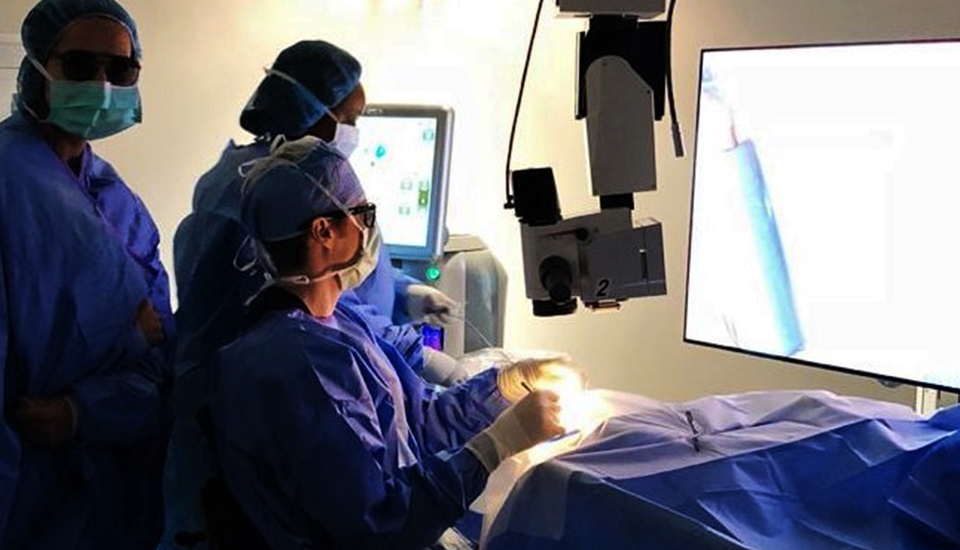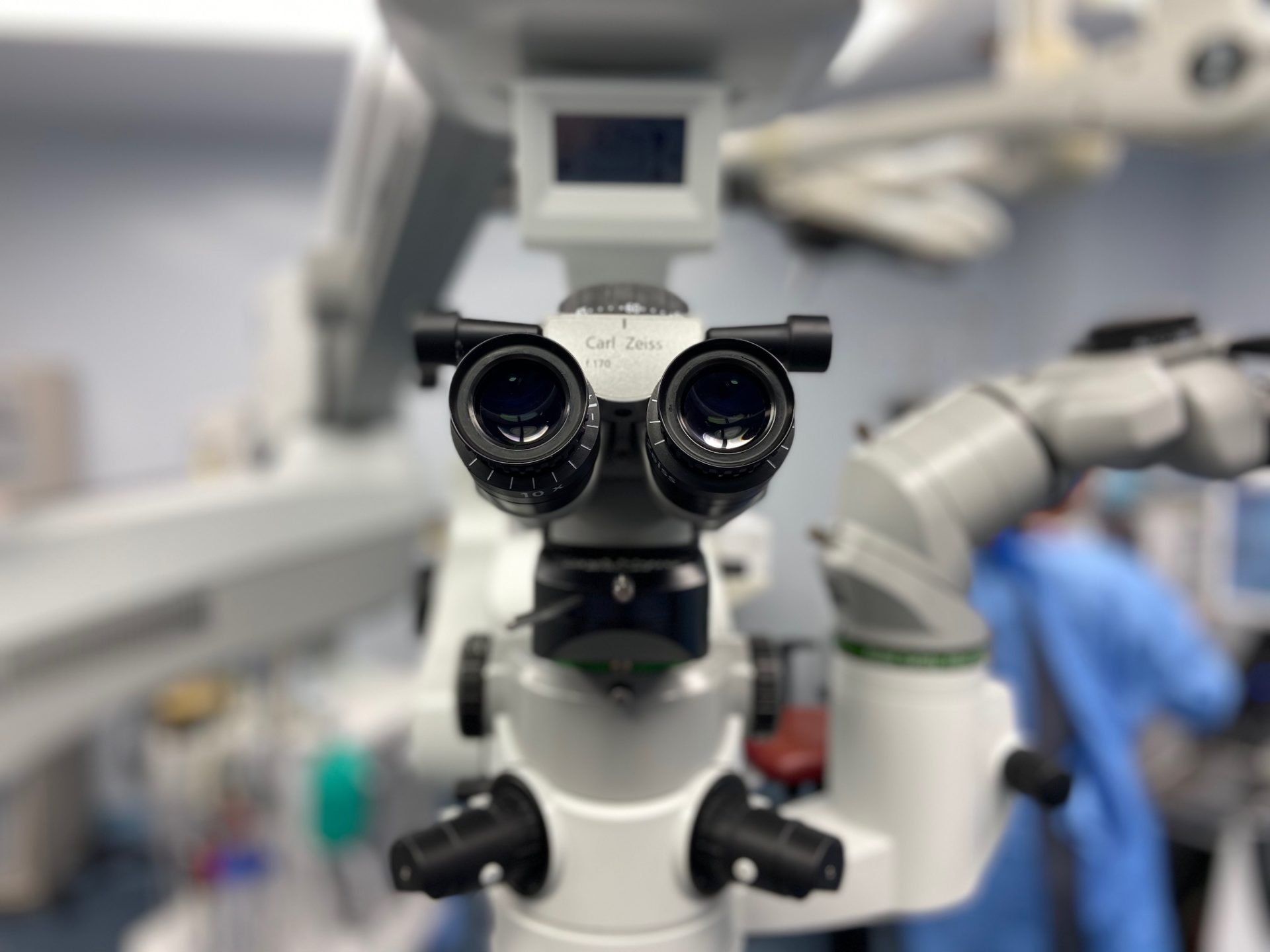
Before Cataract Surgery
If you have a history of Cardiac (Heart), Pulmonary (Lung), or other serious health conditions you will need to obtain Primary Care or Cardiology Clearance prior to surgery. This clearance will need to be faxed or sent to your surgery center in advance.
Prior to surgery, your eye surgeon will take precise measurements of your eye to help determine the power needed for your lens implant (IOL). Sometimes the surface of the eye (the cornea) is too dry or in need of repair prior to surgery. Optimizing the cornea surface improves the accuracy of your eye measurements and the quality of your vision after cataract surgery.
Stop Wearing Contacts Before Testing Appointment
If you wear contact lenses, you must stop wearing them before your preop surgery testing appointment. Contact lenses distort the shape of the cornea which affects the accuracy of the cataract surgery measurements. By staying out of your contact lenses, the cornea will revert to its natural shape.
- Stop wearing SOFT contact lenses 1 week before your preop testing appointment
- Stop wearing SOFT TORIC lenses 2 weeks before your preop testing appointment
- Stop wearing HARD (Hybrid, Rigid, or Scleral) lenses 4 weeks before your preop testing appointment
The Day of Cataract Surgery
Your surgery will be done in an outpatient surgery center or hospital and you will likely go home the same day.
Continue all your usual eye drops as prescribed, including the morning of surgery. You may take your usual blood pressure or heart medications with a small sip of water in the morning unless directed otherwise by your doctor or anesthesia team.
One business day prior to your surgery someone will call you from the surgery center to discuss your arrival time for surgery. Plan to be at the surgery center for several hours.
Surgery requires FASTING. NO EATING OR DRINKING starting at MIDNIGHT the night before surgery. If your surgery is scheduled for the afternoon, then please NO EATING OR DRINKING AT LEAST 6 HOURS BEFORE your arrival time.
Please wear loose comfortable clothing. Shower and wash your hair the evening prior or morning of your surgery. WASH YOUR FACE THOROUGHLY.
No Makeup, Perfume, Lotions, or Jewelry/Valuables. No Smoking or Alcohol 24 hours prior to surgery.
You will need to arrange transportation to and from the surgery. You may NOT drive yourself.
Anesthesia for Cataract Surgery
Many patients worry if cataract surgery will be painful. Modern anesthesia has advanced greatly, helping patients feel comfortable during the procedure.
In addition to local or topical anesthesia, many patients choose to have light sedation which is often administered by an anesthesiologist or nurse anesthetist during surgery.
Topical Anesthesia:
We use eye drops called proparacaine and tetracaine to numb the eye prior to surgery. Once the eye is numb, you may feel mild pressure and cold water during the surgery but not pain. It is normal to see bright lights during surgery as well.
Local Anesthesia:
In addition to topical anesthesia, your surgeon may recommend numbing the eye with an injection around the eye. This is called a peribulbar or retrobulbar block and it can help place the eye in a deeper state of numbing. This type of anesthesia is typically offered for surgeries anticipated to be longer or more challenging in nature.
Intravenous (IV) Anesthesia:
Though many patients prefer it, IV sedation is not necessary for eye surgery. Sedating medications, such as Versed and Fentanyl, are given to help relax you during your surgery. All medications are dosed incrementally to achieve the right level of sedation and comfort for each patient. Please be aware that even with IV sedation, MANY PATIENTS WILL BE AWAKE DURING SURGERY. Do not expect to be “put to sleep” as your eye surgeon often prefers that you can hold still and focus on the microscope light during the procedure.
During Cataract Surgery
The surgery is performed using a powerful microscope. It is normal to feel some pressure and cold water and see lots of interesting bright lights during the procedure. To gain access to the cataract, tiny incisions are made in the eye and then the cataract lens is broken into tiny fragments and vacuumed from the eye. Then the new lens is placed in the eye and the tiny wounds sealed. Often, the eye is sealed without sutures (stitches) and the “self-sealing” incisions heal over time. Typically, the surgery takes a few minutes to complete and in the end, a rigid shield is often placed over the eye to protect it.
Second Eye Syndrome
It is very common for patients to believe the experience of surgery on the second eye is completely different than it was for the first eye. Second eye syndrome includes feeling like the steps of the surgery are different, or that they were asleep last time but this time they are awake, or that the surgeon didn’t do these steps last time. Eye surgery is performed in a very standardized way much like the steps a pilot takes flying a plane in the airline industry. Why then do patients feel so different the second time? Largely, this feeling is a side effect of one class of the sedating medications (often Versed). These medications help to relax patients but may also cause short term amnesia during the procedure. This amnesia may prevent you from remembering everything about the first eye surgery and will likely prevent you from remembering things for the second eye too.
Cataract Surgery Recovery
It is common and normal for your eye to be red and feel scratchy and sore after surgery. You may use lubricating drops to help. It is also normal for you to see glare and halos or foggy vision immediately after surgery. You can expect these changes in your vision to gradually improve in the days to weeks following surgery.
Pick up your medication eye drops PRIOR to surgery as you will need to start them right away after surgery. Your doctor will review your post-op medications with you so please bring them with you to your follow up appointment.
You may resume your normal diet and medications immediately after surgery. Light duty activities such as reading, TV and computers are ok but these activities can make your eyes feel more scratchy, sore, and dry especially right after surgery.
Resuming Activities After Surgery
Wait to drive until advised by your doctor. You may resume normal activities and resume wearing eye makeup 1 week after surgery.
Sleep in the eye shield at night. It is never a good idea to rub your eye, but especially avoid rubbing your eye for 2-3 weeks after surgery. You may shower after surgery but face away from the water and avoid getting water directly in your eye for a few days.
No heavy lifting (more than 25 lbs) for the first few days after surgery.
NO SWIMMING POOLS, HOT TUBS, or GARDENING (LAWN MOWING) for 3 weeks after surgery. These activities increase your risk of serious eye infection during the post-op period. Wait 3 weeks to play woodwind and brass instruments. Wait 2 months to scuba dive after eye surgery
You may wear your regular eyeglasses after surgery however the old prescription will no longer work in the surgical eye. Some people opt to remove the lens in front of the eye that had surgery. Typically glasses are prescribed about 4 weeks after surgery though sometimes it may be advised to wait longer for the eye to heal.
If you experience severe eye pain, a curtain, or veil in your vision, or a sudden shower of black dots, or a significant decrease in your vision then call the office immediately at 941-499-1570.

